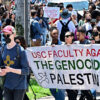Strong marriage and family relationships are crucial to fighting poverty. This was the message shared by grassroots leaders at an anti-poverty conference sponsored by The Heritage Foundation and the Center for Neighborhood Enterprise this past September.
These leaders shared firsthand experience and common-sense intuition about poverty reduction. They explained what sociological research and data continually underscore: that the intact family is the greatest weapon against child poverty, high-risk behavior, delinquency, and lower academic achievement.
Among the attendees was Bishop Shirley Holloway, who has created three facilities for homeless men, women, and families. Many of those who find their way to her door are hardcore alcoholics and drug addicts. Holloway describes her work as providing “individuals that society has cast aside” with the “building blocks” to restore their lives.
One crucial building block is providing men and women with guidance in forming and strengthening their marriages. Holloway brought a number of graduates from her program with her to the conference, many of them now couples. In fact, 100 couples have married through her ministry, of which 97 are still intact.
Among the successful couples of Bishop Holloway’s House of Help/City of Hope are James and Angela Woods. Widowed in 1989, Angela came to the ministry addicted to drugs and, in her words, “on the street with my two children in a stroller made for one” and “in the depth of despair.” James was a military vet who had drifted back to the ways of old friends when he saw that their drug-sales profits dwarfed his humble paycheck as a truck driver. He came to the House of Help after serving two-and-a-half years of a 20-year term.
James and Angela began to put their lives back together and met through the ministry. They married in 2000. Their union benefited from pre-marriage counseling and financial guidance at the House of Help. Today, the Woodses have five children and four grandchildren and are proud homeowners.
Another charity featured at the conference was Project Impact in Dayton, Ohio, directed by Marva Mitchell. It addresses violence and delinquency, substance abuse, and truancy among youths who are referred to it by the courts. The program involves a youth’s entire family in its 12-week guidance and counseling sessions, which teach goal setting, anger management, and conflict resolution. In addition, Project Impact coordinates a number of initiatives to equip parents with parenting skills and support.
Grassroots initiatives that work with addicts and alcoholics often stress the irreplaceable role of family relationships. Paul Echtencamp of the Youth Challenge of Connecticut program declares, “If you [want to] reach the addict, you have to reach the family.”
The root of addiction was summarized at the conference by Roman Herrera of the San Antonio-based Outcry in the Barrio ministry: “We live in a fatherless society…and there will always be a hole in a heart where that relationship is missing.”
Government at all levels should take its cue from the wisdom of grassroots leaders’ firsthand experience, and support policies to promote and strengthen marriage. In addition, government should ensure that it does not hinder the work of grassroots leaders. While a social safety net may be able to provide short-term material relief, addressing deep-rooted human need is another matter.
The relational work of organizations such as House of Help/City of Hope can have dramatic effects in healing broken relationships and thereby helping to cure a significant contributor to poverty.


























